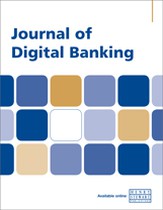Low/no-code and traditional code integration in digital banking
Abstract
This paper seeks to combine the merits of low/no-code programming (LNCP) with traditional programming (TP) systems for increased agility in digital banking software development. While it is easy to fall prey to shiny object syndrome in today’s dynamic banking technology landscape, it is not easy to select the right technology to suit the current and future needs of the financial industry. Instead, LNCP makes it possible to lower the technical entry barriers to technology development. Integrating TP with LNCP, when needed, compensates for the shortcomings related to LNCP and provides digital banks with a more comprehensive software development approach. The adoption of this approach improves time-to-market of new innovative financial solutions. There has been little progress in this direction, academically or in practice. This paper includes an empirical study, interviews with banking professionals, on the merits of LNCP and TP, as well as an experimental project implementation that integrates LNCP and TP in the development of a retail Internet banking application. In the context of digital banking solution development, the result of the experiment reveals the merits of LNCP/TP hybrid systems in terms of agility, scalability, change management and cost-effectiveness.
The full article is available to subscribers to the journal.
Author's Biography
Yeo Kim Siang is a postgraduate student, Master of IT in Business, at Singapore Management University. Relatively new to the working world, Kim Siang has three years of experience in software development, data engineering and data analytics, specifically in the banking and FinTech industries. Currently, he is balancing management roles as a project manager and technical roles as a data analyst and engineer, managing his company’s latest migration efforts from its legacy systems into a new PySpark-supported system.
Alan Megargel , PhD, is Associate Professor of Information Systems (Practice) at Singapore Management University, where he serves as Coordinator for the undergraduate Financial Technology Career Track. His current areas of specialisation include enterprise architecture in banking, service-oriented architecture (SOA), payments technology and nonbank FinTech alternative financial services. Alan has 30 years of industry experience, having served as Chief Technology Officer at TIBCO Software Asia, Vice President and Head of SOA at OCBC Bank and Senior Enterprise Architect at ANZ Bank. His banking technology experience covers retail and corporate banking, Basel II, data warehouse, data centre operations and technology infrastructure. Alan holds a Doctor of Innovation from Singapore Management University and a Master of Science in Software, Systems and Information Engineering from the University of Sheffield.
